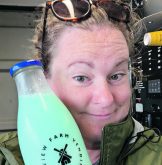As producers begin cleaning out farm buildings this spring, health officials say they should be careful to avoid getting a virus spread by infected rodents.
Though cases are rare, hantavirus can be lethal and cause sickness. People can get it by breathing in contaminated airborne particles from the droppings, urine and saliva of mice.
To mitigate exposure, it’s recommended that people first air out a building by opening doors or windows before cleaning it, said Dr. Shobhit Maruti, a medical officer of health with Alberta Health Services.
Read Also

Powerful solar storm lights up night time sky
Prairie skywatchers have been on high alert the last few nights as spectacular aurora displays have made the night time…
He said buildings should be ventilated for about half an hour and rubber gloves should be worn when cleaning. While a respirator could be used as an extra precaution, he said it’s not needed.
If someone sees mouse droppings, a mice nest or dead mice during the walk-through, they should soak the substances with a solution made up of one part bleach and nine parts water for five minutes. This method will help ensure dust particles stay down, he said.
“You don’t want to vacuum or sweep before wetting the droppings. You don’t want to create that dust.”
Once soaked, the droppings or other mice remnants should be picked up with a paper towel and then placed in a sealed plastic bag. The bag should then go into a lidded garbage bin.
When everything is picked up and cleaned, he said people should wash their rubber gloves and then wash their hands.
If someone is exposed to hantavirus, they can feel symptoms about one to five weeks after. Symptoms resemble a severe flu, and include fever, headache, chills, body aches, and abdominal and breathing problems.
Maruti said anyone with such symptoms should quickly see a doctor.
“It’s a rare thing, but in the rare instance it has been known to be fatal,” he said.
There were three cases of hantavirus last year in Alberta. Two were in the northern part of the province and one was in the central region. In 2016, there were two cases, while 2015 had four cases and 2014 had five. There have been no recorded cases of hantavirus this year.
To avoid mice issues in the future, Maruti recommended people seal cracks and avoid leaving food out. If the problem persists, traps or chemicals like cyanide may be used to help get rid of the mice.
If dealing with significant infestations or with infestations in closed spaces with poor ventilation, people in Alberta can contact Health Link at 811 to discuss precautions.















